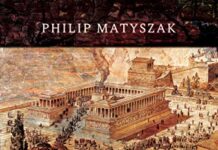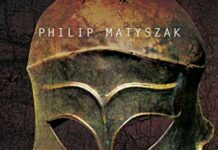
Ebook Info
- Published: 2006
- Number of pages: 296 pages
- Format: PDF
- File Size: 33.93 MB
- Authors: Philip Matyszak
Description
The story of one of the most colorful dynasties in history, from Caesar’s rise to power in the first century BC to Nero’s death in AD 68 This engaging new study reviews the long history of the Julian and Claudian families in the Roman Republic and the social and political background of Rome. At the heart of the account are the lives of six men―Julius Caesar, Augustus, Tiberius, Caligula, Claudius, and Neromen―who mastered Rome and then changed it from a democracy to a personal possession. It was no easy task: Caesar and Caligula were assassinated, Nero committed suicide, and Claudius was poisoned. Only Augustus and Tiberius died natural deaths and even that is uncertain. The Julio-Claudian saga has a host of other intriguing characters, from Cicero, the last great statesman of the Republic, to Livia, matriarch of the Empire; the passionate Mark Antony and the scheming Sejanus; and Agrippina, mother of Nero and sister of Caligula, who probably murdered her husband and was in turn killed by her son. Set against a background of foreign wars and domestic intrigue, the story of Rome’s greatest dynasty is also the story of the birth of an imperial system that shaped the Europe of today. 90 Illustrations
User’s Reviews
Editorial Reviews: From Publishers Weekly When Rome became a republic in 509 BC, its citizens so deplored the idea of monarchy they would not even allow a foreign king into the city. Despite such thinking, the Republic’s institutions were vulnerable to the power, money and influence of its aristocracy. Matyszak’s book is an engrossing and expertly assembled presentation of Rome’s first families, the Julio-Claudian line of leaders whose example, Matyszak argues, “continues to convince many that an effective autocracy is superior to a dysfunctional democracy.” Two of Matyszak’s main reasons for re-examining this oft-explored era are to overturn common myths, including the widely-accepted, “facile” explanation for Rome’s downfall-strain caused by expansion and military campaigns-and to prove that empire is not always a dirty word. Matyszak follows the slow transformation of a republican government into an expansive imperial power, beginning with the awkward reconciliation between Julius Caesar’s declaration of dictatorship and the existing Roman constitution, and continuing in small but significant steps amid civil wars and familial infighting. His profiles, from Julius to Nero, are fresh looks at characters marred by caricature and misconception, and his analysis of Rome’s transformation is both instructive and precient, and will give those who employ the term “empire” in contemporary public dialogue much to consider. 90 illustrations.Copyright © Reed Business Information, a division of Reed Elsevier Inc. All rights reserved. About the Author Philip Matyszak is the author of many bestselling books on classical civilization, including The Greek and Roman Myths, Chronicle of the Roman Republic, The Sons of Caesar, Ancient Rome on Five Denarii a Day, Ancient Athens on Five Drachmas a Day, and most recently, Forgotten Peoples of the Ancient World.
Reviews from Amazon users which were colected at the time this book was published on the website:
⭐Very good, concise yet full view of the transition from the ruins of the old republic to a new order. The genius of Augustus in establishing a complete restructuring of the republic, yet keeping the republican form is traced. Coopting the republic form when practical, building parallel structure when needed to accomplish the transition, Augustus set Rome on a new path that continued in the East for another 15 centuries and is present to this
⭐A fascinating survey of the Julio-Claudian dynasty, Matyszak’s work explains who they were, how they rose to power, how they effectively destroyed the Republic, and how they finally destroyed themselves. Rich in anecdotes and analysis, this is a clear, readable introduction to the origin of the Roman Empire and the remarkable families that created it – Julius Caesar’s brilliance and ambition, offset by the ruthless efficiency of Augustus, the grim determination of Tiberius, the reckless indulgence of Caligula, the sincere but ultimately failed reforms under Claudius, and finally the downfall of the family during the mad reign of Nero. For the dedicated Romanophile, this is a clear and concise explanation of how the Julio-Claudians compassed the death of the Republic, and for the amateur historian, it’s a great primer. Well done!
⭐Interesting book profiling Julius Caesar, Augustus, Caligula, Claudius and Nero.While not the best book written on the subject, it encapsulates the Julio-Claudian dynasty excellently.It provides a fairly detailed account of what each Caesar accomplished. Written in a conversational manner, it is easy to read and gives a good account of this families reign.It deserves a place among your Roman history books.
⭐The overall impression one takes from this book, other than the fact that it is an interesting and fairly quick read, is that the author is seemingly apologetic for the heinous crimes and misdemeanors of the Julio-Claudian rulers of Rome.He still addresses the rumors and innuendos of such authors as Suetonius, though seems to place these actions in the perspective of their times and questions the likelihood that they even occurred.Granted, there is little if any way to confirm the entertaining gossip of Suetonius though trying to put a shine on the perceived rotten apple of Caligula after nearly two millenia of bad press is admirable but certainly a minority opinion.The text appears to be a positive rendering of the Caesars and their contributions to the creation of and the century of stability that was the Roman Empire prior to the death of Nero.Though for all the positives, the creative accounting utilized by the author does not do much towards altering the balance sheets of history. Despite all the positives, the negatives weigh heavily against these figures as they will against our present day best and worst in the centuries to come.Overall, the book should be read as a compliment along with Tacitus, Suetonius and Dio et al.
⭐This is another fantastic pick up and read book by Philip Matyszak and if you are in anyway interested in at least one of the Julio Claudian Dynasty then this will have you hooked. The relaxed style of the author guides you back and forth through the events quoting passages from the historians whilst adding his own learned view where evidence has been lost or subject to hype such as Tiberius’ lifestyle choices in Capri. There are also numerous black and white photographs of marble busts,beautiful Cameos and significant coins of the of the emperors and their families which break up the narrative nicely. This book is also a perfect partner to the BBC I Claudius television programme and in my mind John Hurt will always be Little Boots.
⭐Much better than the usual run of books about the early emperors. Tells the story but gets under the surface more than most of these kind of books.
Keywords
Free Download The Sons of Caesar: Imperial Rome’s First Dynasty in PDF format
The Sons of Caesar: Imperial Rome’s First Dynasty PDF Free Download
Download The Sons of Caesar: Imperial Rome’s First Dynasty 2006 PDF Free
The Sons of Caesar: Imperial Rome’s First Dynasty 2006 PDF Free Download
Download The Sons of Caesar: Imperial Rome’s First Dynasty PDF
Free Download Ebook The Sons of Caesar: Imperial Rome’s First Dynasty





![Gladiator: The Roman Fighter’s [Unofficial] Manual by Philip Matyszak (PDF)](https://sci-books.com/wp-content/uploads/2022/10/0500051674-218x150.jpg)